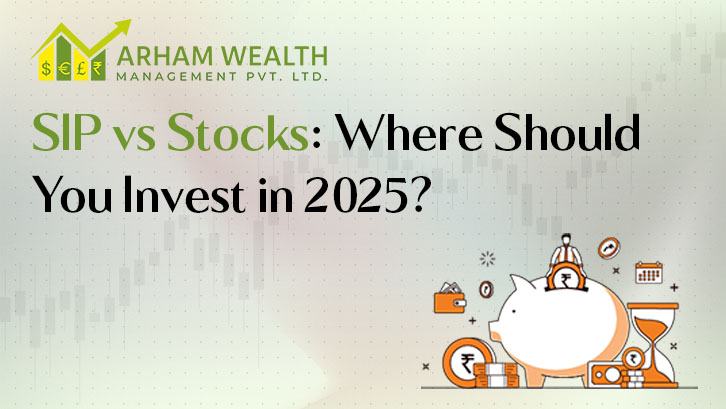


In 2025, as India’s economy continues to grow and financial literacy improves, more individuals are exploring investment options to build wealth, save for future goals, and secure their financial future. Among the most popular choices are Systematic Investment Plans (SIPs) and direct stock investments. But the big question is: Where should you invest in 2025 — SIPs or stocks?
Each investment method comes with its own set of risks and rewards, and choosing the right one depends on several factors including your risk tolerance, financial goals, understanding of the market, and even aspects like your Cibil Score and tax planning strategies.
Let’s dive deep to compare SIP vs Stock in the context of the current financial environment and help you decide which investment suits you best in 2025.
A Systematic Investment Plan (SIP) is a method of investing a fixed amount in mutual funds at regular intervals (weekly, monthly, quarterly). SIPs help investors benefit from rupee cost averaging and the power of compounding over time, making them ideal for long-term wealth creation.
Stock investment involves directly buying shares of publicly listed companies. This allows investors to become part-owners of the company, potentially reaping higher returns but also exposing themselves to higher risk due to market volatility.
Verdict: SIPs are suitable for risk-averse investors, while stocks are better for those with a high risk appetite and market knowledge.
Market volatility is a constant in the stock market. While it presents opportunities, it can also lead to impulsive decisions.
Verdict: SIPs encourage disciplined investing and remove the need to time the market.
Verdict: Stocks can outperform SIPs in terms of returns but come with higher risk.
If you're planning to invest to save tax, both SIPs and stocks offer certain benefits under Section 80C and capital gains tax exemptions.
Verdict: SIPs, especially in ELSS, are better for tax-saving purposes.
Verdict: SIPs are better for those who want a passive investment option.
You might be wondering how your Cibil Score comes into play here. While Cibil Score is a measure of your creditworthiness and does not directly impact your investments, maintaining a good credit score can indirectly help you in the following ways:
On the other hand, speculative stock trading, especially on margin or through borrowed funds, can risk both your investment and credit profile.
Verdict: SIPs support more stable financial behavior, positively influencing your overall financial health and indirectly supporting your Cibil Score.
To invest in either SIPs or stocks, you may need to go through the process of Opening a Demat Account, although the requirements vary.
In 2025, most brokers and fintech platforms have made this process seamless with paperless KYC, Aadhaar-based verification, and instant account opening.
Verdict: Opening a Demat Account is essential for stock investments and optional for SIPs depending on your mode of purchase.
Read more: How to Open Demat Account with Arham Wealth?
SIP is ideal for:
In 2025, with the rising cost of living and inflation, SIPs provide a structured and goal-based investment avenue.
Stock investments are best suited for:
Stocks are suitable for aggressive investors who want more control over their portfolio and returns.
Why choose one when you can benefit from both?
A hybrid investment approach that includes SIPs for long-term financial goals and a small portfolio of hand-picked stocks for short- to mid-term growth can offer the best of both worlds.
Also, if you’re planning for tax benefits, include ELSS through SIPs and hold stocks for over one year to minimize tax burden via LTCG benefits.
| Factor | SIP | Stocks |
|---|---|---|
| Risk | Low to Moderate | High |
| Returns | Moderate, stable | High, volatile |
| Time Commitment | Low | High |
| Expertise Required | Minimal | High |
| Tax Benefits | Available (ELSS) | Limited |
| Impact on Cibil Score | Indirectly positive | Can be negative if done with credit |
| Requires Demat Account | Optional | Mandatory |
In 2025, if you're a beginner or someone looking for a hands-off, reliable way to grow wealth, SIPs are the way to go. But if you have market experience, risk tolerance, and want higher returns, direct stock investment can be rewarding.
In 2025, the choice between SIP and direct stock investment comes down to your personal financial goals, risk tolerance, and level of involvement. SIPs offer a structured and consistent path to wealth creation, making them ideal for long-term investors who value stability and convenience. On the other hand, investing directly in stocks gives you the flexibility to capitalize on market opportunities and potentially earn higher returns, especially if you're comfortable navigating market volatility.
Whichever route you choose, having a clear strategy, understanding tax implications (especially if you want to invest to save tax), and maintaining a healthy financial profile—including your Cibil Score—will position you for long-term success.
If you’re looking to begin your journey in the stock market, Opening a Demat Account is your first step. Arham Wealth offer a smooth, paperless onboarding process to help you get started with investments, even investors can open a Demat account and explore a wide range of direct investment opportunities with ease.
Whether you're a beginner or looking to expand your portfolio, 2025 is a great time to take control of your finances and invest wisely. Choose the path that fits your goals—and start building your wealth, one smart decision at a time.
Disclaimer: Investment in securities market is subject to market risk. Read all scheme-related documents carefully before investing. This article is for informational purposes only and does not constitute financial advice.